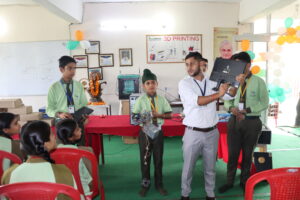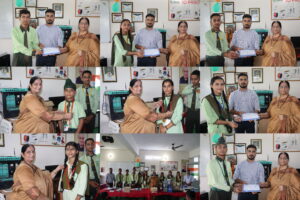Background
Atal Tinkering Labs (ATLs) are a part of the Atal Innovation Mission (AIM) launched by the Government of India in 2016. The aim of the ATLs is to foster a culture of innovation and entrepreneurship among young students in India by providing them with access to cutting-edge technologies, state-of-the-art equipment, and mentorship from experts in the fields of science, technology, engineering, and entrepreneurship.
The ATLs are a platform for students to experiment, tinker, and invent, and to develop a hands-on approach to learning. The labs are designed to encourage students to explore their interests, foster creativity and imagination, and develop skills that are essential for success in the 21st century, such as critical thinking, problem-solving, and collaboration.
The ATLs are equipped with state-of-the-art equipment and facilities, enabling students to work with cutting-edge technologies and tools. The labs promote interdisciplinary learning, integrating concepts from science, technology, engineering, arts, and mathematics (STEAM) to encourage holistic problem-solving.
Through the ATLs, students have the opportunity to work on innovative projects and bring their ideas to life. The labs provide students with a unique opportunity to pursue their interests, explore new fields of study, and develop skills that are essential for success in the 21st century.
The ATLs are open to students between the ages of 12 and 18 and are established in schools across India. The scheme aims to establish over 10,000 ATLs in schools across India over a period of five years, with the goal of reaching more than two and a half million students.
Overall, the Atal Tinkering Labs provide a unique platform for young students to develop their creativity, curiosity, and innovation skills, and to make a positive impact on the world around them.
Objectives
The specific objectives of the ATLs are to:
- Cultivate a culture of innovation and entrepreneurship among students
- Provide students with access to state-of-the-art equipment and facilities for experimentation and innovation
- Foster creativity, imagination, and curiosity among students
- Develop a problem-solving mindset and skillset among students
- Promote teamwork, collaboration, and communication skills among students
- Develop an entrepreneurial mindset among students and encourage them to develop innovative products and solutions
- Provide students with exposure to cutting-edge technologies and trends in science and technology.
Overall, the goal of the ATLs is to help students develop the skills and mindset they need to succeed in the modern world, and to prepare them to become the next generation of innovators, entrepreneurs, and leaders.
Features of Scheme
The Atal Tinkering Labs (ATLs) scheme has several features that distinguish it from other educational initiatives. Some of these features include:
- Hands-on learning: ATLs provide students with a hands-on approach to learning, encouraging them to experiment, tinker, and invent.
- State-of-the-art facilities: The ATLs are equipped with state-of-the-art equipment and facilities, enabling students to work with cutting-edge technologies and tools.
- Interdisciplinary learning: ATLs promote interdisciplinary learning, integrating concepts from science, technology, engineering, arts, and mathematics (STEAM) to encourage holistic problem-solving.
- Innovation and entrepreneurship: ATLs foster a culture of innovation and entrepreneurship among students, encouraging them to develop innovative products and solutions.
- Mentorship and guidance: ATLs provide students with mentorship and guidance from experts in the fields of science, technology, engineering, and entrepreneurship, enabling them to receive personalized support and advice.
- Collaboration and teamwork: ATLs promote collaboration and teamwork among students, enabling them to work together to solve complex problems and develop innovative solutions.
- Exposure to industry trends: ATLs provide students with exposure to cutting-edge technologies and industry trends, enabling them to stay up-to-date with the latest developments in their fields of interest.
Study
Atal Tinkering Labs (ATLs) provide students with a platform to experiment, tinker, and invent, and to develop a hands-on approach to learning. The labs are designed to encourage students to explore their interests, foster creativity and imagination, and develop skills that are essential for success in the 21st century, such as critical thinking, problem-solving, and collaboration.
Here are some of the things that you can study in an Atal Tinkering Lab:
- Science and Technology: ATLs provide access to state-of-the-art equipment and facilities, enabling students to work with cutting-edge technologies and tools. Students can study topics such as robotics, 3D printing, Internet of Things (IoT), artificial intelligence (AI), and more.
- Engineering: Students can learn about engineering principles and practices, and apply them to real-world problems. They can explore different engineering disciplines such as mechanical, electrical, and civil engineering.
- Arts: ATLs promote interdisciplinary learning, integrating concepts from science, technology, engineering, arts, and mathematics (STEAM). Students can study topics such as design, art, and creativity.
- Entrepreneurship: ATLs foster a culture of innovation and entrepreneurship among students. Students can learn about business principles, marketing, and finance, and develop skills that are essential for starting and running a successful business.
- Social Impact: ATLs encourage students to work on projects that have a positive social impact. Students can study topics such as sustainability, environmental conservation, and social justice, and develop solutions that address these issues.
Overall, the Atal Tinkering Labs provide students with a unique opportunity to pursue their interests, explore new fields of study, and develop skills that are essential for success in the 21st century.
ATL Student Projects
- Atal Tinkering Labs (ATLs) provide a platform for students to work on innovative projects and bring their ideas to life. Here are some examples of student projects that have been developed in ATLs:
- Smart Irrigation System: This project involves the development of an IoT-based smart irrigation system that uses sensors to detect soil moisture levels and weather conditions to optimize water usage and increase crop yield.
- Solar-Powered Water Purifier: This project involves the development of a solar-powered water purifier that uses UV-C radiation to kill bacteria and viruses in water, making it safe for drinking.
- Smart Traffic Management System: This project involves the development of a smart traffic management system that uses AI and IoT technologies to optimize traffic flow, reduce congestion, and improve road safety.
- Autonomous Drone: This project involves the development of an autonomous drone that can be used for surveillance, search and rescue operations, and other applications.
- Smart Home Automation: This project involves the development of a smart home automation system that can control lighting, heating, and other home appliances using voice commands or a smartphone app.
- Assistive Technology for the Disabled: This project involves the development of assistive technologies for people with disabilities, such as a braille printer or a wheelchair that can be controlled using brain signals.
These are just a few examples of the many innovative projects that students have developed in ATLs. By working on these projects, students develop important skills such as critical thinking, problem-solving, and collaboration, and gain hands-on experience with cutting-edge technologies and tools.



